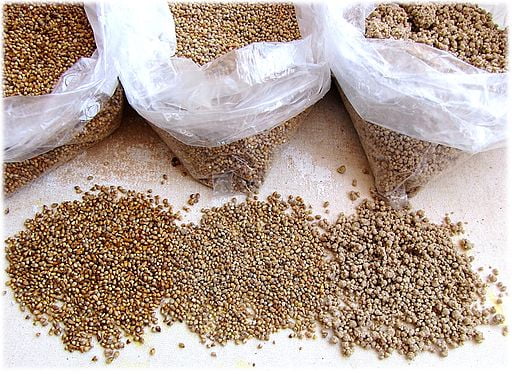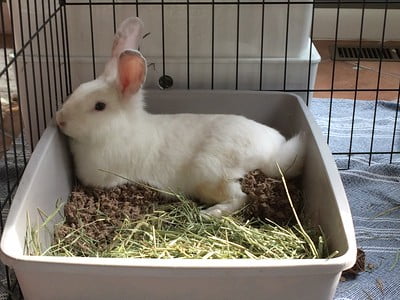Last Updated on March 17, 2023 by Marjon Ramos
The most common reason for the smell of ammonia in a rabbit’s urine is due to the wrong percentage of protein in their diet and dehydration.
Neutering or spaying your rabbit would also reduce the smell of ammonia in their urine.
Additionally, your cleaning schedule of their litter box would also be a factor in how smelly their urine is. Ideally, you should clean your rabbit’s litter box every 1-2 days.
Finally, health problems like parasites and infections can affect your rabbit’s kidneys and, in turn, the smell of their urine. If you suspect that this is the case, bring your rabbit to a veterinarian.
Now that I’ve given you the gist of the article, read on as I explain in more detail why your rabbit’s pee smells like ammonia:
Table of Contents
Possible reasons why your rabbit’s pee smells like ammonia.

Smelly urine are one of the most common concerns of rabbit owners all over the world. Knowing the reason why it happens is important because it could tell you a lot about your rabbit’s current condition.
Here are the most common reasons why your rabbit’s pee smells like ammonia:
High-protein diet.
One of the most common reasons why your rabbit’s urine smells like ammonia is their diet.
A high-protein diet would increase the amount of excess nitrogen in your rabbit’s urine.
The excess nitrogen would then be converted to ammonia by the bacteria in your rabbit’s urine.
If your rabbit’s urine smells like ammonia, its possible that the pellets you’re feeding your rabbit has the wrong protein percentage.
Check the label of your rabbit’s pellets and look for the protein percentage.
Here are the recommended nutritional facts for rabbits according to the American Rabbit Breeders Association.
| Fiber | Fat | Calcium | Protein |
|---|---|---|---|
| •12% to 22% •Not less than 18% | •3% or less | •Less than 1% | •14%-18% |
Not neutered or spayed.
Neutering or spaying your rabbit would also affect how smelly their urine is. Typically, rabbits that are not neutered or spayed will have smellier urine due to hormones.
That’s why it’s always recommended that you get your rabbits neutered or spayed. Doing so could reduce the smell of ammonia in their urine considerably.
The smell of ammonia in your rabbit’s urine would typically start after they reach sexual maturity. On average, rabbits reach sexual maturity at 4-6 months, depending on the breed.
Make sure that you get your rabbits neutered at months 6–8 if you want to stop their urine from smelling like ammonia.
You’re not cleaning your rabbit’s litter box often enough.

It’s also possible that you’re not cleaning your rabbit’s litter box often enough if you’ve done everything on this list and the smell is still bad.
The reason is that even though neutering and feeding them the right diet would reduce the nitrogen in their urine, rabbits would still have some amount of it whatever you do.
Additionally, the smell of rabbit’s pee will get worse the longer you leave them alone.
The recommended cleaning schedule for rabbits is every 1-2 days.
Waiting longer than that is not recommended due to the amount of urine that’s going to accumulate.
Here is the table on the amount of urine rabbits produce per day based on their weight:
| Rabbit’s weight based on breed | Urine produced per day |
|---|---|
| Small breed (1.1–3.5 pounds) | 60-180 ml |
| Medium breed (6 to 10 pounds) | 330-560 ml |
| Large breed ( 9 and 12 pounds) | 500-675 ml |
Here’s the math of the different cleaning schedule:
Let’s say you have a medium-bred rabbit:
Cleaning your rabbit’s litter every two days = 660–1,120 milliliters of urine and 440–900 grams of poop.
Cleaning your rabbit’s litter every week = 2,310–3920 ml of urine and 1,540–3,150 grams of poop.
Imagine cleaning 3 kilos of poop mixed in with 4000 ml of urine. Not to mention the smell of rabbit’s poop and urine gets worse as time goes on.
Dehydration
Dehydration would also make your rabbit’s urine smell like ammonia. Smellier urine is one of the most common symptoms of dehydration in rabbits.
To tell if your rabbit is dehydrated, you have to look for its symptoms:
Make sure that your rabbit is drinking enough water every day and always provide them with clean, drinkable water.
Here’s a table that shows how much water a rabbit would drink depending on its breed:
| Rabbit’s weight based on breed | Water requirement per day |
|---|---|
| Small breed (1.1–3.5 pounds) | 25-158mL |
| Medium breed (6 to 10 pounds) | 136-454mL |
| Large breed ( 9 and 12 pounds) | 204-544mL |
The amount of water that rabbits need to drink per day is highly dependent on a lot of factors. As an example, if it’s hot where you live, your rabbits might need to drink more water than usual.
Rabbits that are eating a lot of vegetables might not drink water at all because most vegetables that rabbits eat already have a lot of water in them.
Health problems
If you’ve tried everything on this list and your rabbit’s urine still smells like ammonia, then it is possible that your rabbit is suffering from a health condition.
As an example, a parasite called E. cuniculi could affect your rabbit’s kidney and make their breath and urine smell like ammonia.
If you suspect that your rabbit might be suffering from a health related condition, take them to a rabbit-savvy veterinarian for proper advice.
Does gender affect the smell of ammonia in rabbit’s urine?
Gender would also affect the smell of your rabbit’s urine. Usually, male rabbits have a stronger scent of ammonia in their urine compared to female rabbits.
But that’s not always the case. Every rabbit is different, and there are a lot of variables that can affect your rabbit’s urine, like their health, diet, hydration, hormones, etc.
So if your female rabbit has a stronger scent of ammonia compared to your male rabbit, it’s not enough to cause a concern.
You should still look for additional symptoms like changes in their poop, urine, or behavior before drawing any conclusions.
How to prevent your rabbit’s pee from smelling like ammonia?

You should start with correcting your rabbit’s diet, hydration, and getting them neutered or spayed because that is the most common reason why their urine smells.
You should also regularly clean your rabbit’s litter box, ideally every day. Additionally, buy a more absorbent litter pellets.
If that checks out, you should consider bringing your rabbit to a veterinarian because it could be due to a health condition that only a rabbit-savvy veterinarian could properly diagnose.
Conclusion
If your rabbit’s urine smells like ammonia, it could be due to the wrong protein percentage in their diet or because they are not spayed or neutered.
It could also be because you haven’t cleaned their litter box often enough and the smell is still bad.
Make sure that your rabbit is drinking enough water every day and always provide them with clean, drinkable water because dehydration could also affect the smell of their urine.
Finally, you should bring your rabbit to a veterinarian if you’ve tried everything and their urine still smells like ammonia.
Health problems like parasites or infections could affect the kidney and in turn the smell of their urine.
Cite this article:




